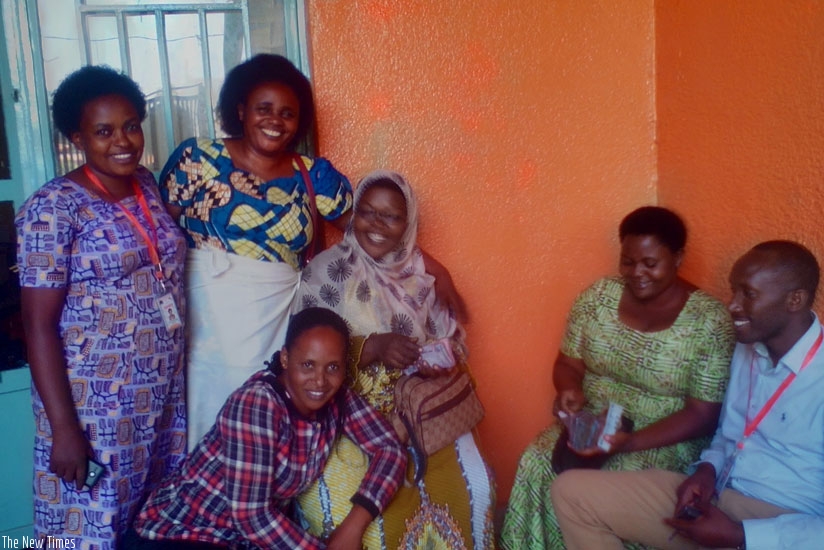As Mujyawimana attends to customers one can see she is contented. Gone are the days when she had to sell her goods looking over her shoulders to avoid arrest by city law enforcement officers.


As Mujyawimana attends to customers one can see she is contented. Gone are the days when she had to sell her goods looking over her shoulders to avoid arrest by city law enforcement officers.
Mujyawimana like many other street vendors had a lot of run-ins with law enforcers as she tried to earn a living from the street selling carrots.
However, she can now conduct business in an organised manner at her stall, thanks to a co-operative formed by carrot farmers and some former street vendors in Nyabugogo, Gasabo District.
Duhuzumurimo wa Karoti (CODUKA) Co-operative seeks to create an organised business environment and also provide farmers ready market for their produce.
This arrangement has helped avoid the kind of run-ins with law enforcement officers the likes of Mujyawimana used to go through before joining the group about 10 years ago.
According to Audace Kayonde, the president of CODUKA Co-operative, carrot vendors were, previously, not regulated, were disorderly and used to dump rubbish all over the place, compromising hygiene in the area.
"Most of members were vending carrots in various places, which was also a security threat due to disorder that characterised their operations,” Kayonde says. He explains that the co-operative started with about 20 people bringing together former street vendors and carrot farmers.
"We are now working from an orderly environment and we have been able to open an account to save our money, from which each members gets Rwf50,000 annually to cater for financial needs like payment of health insurance fees,” Kayonde says.
Agro-processing
CODUKA Co-operative, also loosely translated as "let us work together towards carrot processing” supplies carrots to vendors, and supports farmers across the country especially in Northern and Western provinces.
Kayonde says the co-operative has a vision of engaging in modern carrot processing, particularly to make juice for the local and export markets. He says value addition benefits farmers and the group as the product would be fetching more money compared to unprocessed carrots that are sold for food as vegetables.
"We believe the future lies in agro-processing which can help create more jobs and improve farmers’ income. We have started a carrot juice making project to reduce waste and loss to farmers. We want to transform carrots into other various products besides selling them as foodstuff,” Kayonde notes.
Though the co-operative presently makes carrot juice, it is only for immediate consumption. The juice, which was exhibited during the last agriculture show in June, cannot be packaged or kept for future consumption, Kayonde explains.
He says the project could also solve the challenge of price fluctuation, especially during the harvest season. "We want to open branches in all the provinces to provide farmers a ready market for carrots. We are also working with National Agricultural Export Board (NAEB) to link us to more markets.
"The co-operative plans to seek new markets, targeting different schools, institutions and hotels,” he says.Kayonde says at the beginning, every member contributed Rwf5,000, which has since risen to Rwf1 million for new members.
He says member contributions on the co-operative account ranges from Rwf500,000 to Rwf1 million each, depending on when one joined the group.
He says the co-operative has already bought a commercial building at Rwf17 million, which generates Rwf180,000 every month from rental fees. Started in 2011, the co-operative now has 75 members; 41 women and 34 men.
Challenges
Kayonde says the carrot seeds on the market are not good for Rwandan soils.
"We are lobbying leaders to get us resistant carrot seeds that can do well in our soils because the current variety rots in the early stages of germination,” Kayonde says. The co-operative currently hires trucks to transport carrots from across the country, which is costly.
Beneficiaries speak out
Florence Mukakamanzi has been a member of CODUKA Co-operative since its inception in 2011. She had been involved in the carrot business for nine years by then operating from the general food market of Nyabugogo.
"We were sensitised about benefits of working in co-operatives and decided to form one for carrot sellers. We had a vision of transforming our livelihoods through working together and marketing the vegetable collectively as a group to gain more,” Mukakamanzi says.
Mukakamanzi says she has managed to pay school fees for her three children in university, two of whom are now graduates.
"I am no longer renting after building my own residential house in Kigali city, thanks to the support from the cooperative,” she says.
Jean de Dieu Nsengiyumva says the co-operative guaranteed his loan from a bank to expand his business. He says it is sad that many people are still ignorant about the strengthen and rewards that come with working in groups.
Jeannette Kampire joined CODUKA cooperative in 2012 after completing secondary school and she is currently its secretary.
"I had come to see what they were doing and was impressed. So, I decided to join them and, though I did not know much about the business, I started investing with the group,” Kampire says.
Kampire says she received various job offers elsewhere but chose to work with the co-operative "because I wanted to contribute more to its growth besides being a member”.
She says she has been able to pay school fees for her children with the support of co-operative.
Rosine Uwamahoro, another member and former street vendor, says the co-operative has given her peace of mind, adding that previously, she was always restless while vending her potatoes for fear of being arrest by enforcement officers.
Uwamahoro says the co-operative supports members in many ways, noting that a member is given Rwf100,000 if they lose a close relative, while those getting married get Rwf50,000 contribution.


